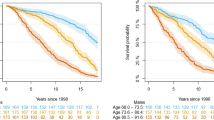Abstract
The main objective of this study was to analyze how the identification of determinants of survival is dependent on age at the time of data collection and on the length of the predictive period. The study is part of a gerontological and geriatric population investigation in Göteborg (Gothenburg), Sweden, called H70, which is a longitudinal study based on a large random sample of men and women born in 1901/1902 in Göteborg. They were first examined at the age of 70, and have then been re-examined at the ages of 75 and 79. Twelve variables from different areas were selected for use in the present study. As physical health has proven to be highly correlated to survival, the sample was split into two subgroups, one consisting of elderly with few health problems and the other of less healthy elderly. All analyses were performed on each gender separately, and on the whole samples of men and women, respectively, as well as on each health subgroup. The results show that the statistically significant determinants of survival differ substantially between the two subgroups. In addition, age at examination and length of predictive period proved to be very important in identifying determinants of survival. Lung capacity, measured by peak flow, was the only variable, among those selected for this study, that had predictive power for both genders, in both health groups and at each of the three observation ages.
Similar content being viewed by others
References
Palmore E.B.: Predictors of successful aging. In: Palmore E.B. (Ed.), Normal aging III, Reports from the Duke Longitudinal Studies, 1975–1984. Duke University Press, Durham, N.C., 1985, pp. 29–36.
Idler E.L., Kasl S.: Health perceptions and survival: Do global evaluations of health status really predict mortality? J. Gerontol. 46: S555–S565, 1991.
Kaplan G., Camacho T.: Perceived health and mortality: A nine-year follow-up of the human population laboratory cohort. Am. J. Epidemiol. 117, 292–304, 1983.
Palmore E.B.: 7 Predictors of the longevity difference. Gerontologist 22: 513–518, 1982.
Berg S.: Aging, behavior and terminal decline. In: Birren J.E., Schaie K.W. (Eds.), Handbook of the Psychology of Aging, ed. 4. (Chapter 18), Academic Press, San Diego, 1996 (in press).
Wilkie F., Eisdorfer C.: Terminal changes in intelligence. In: Palmore E.B. (Ed.), Normal Aging II, Reports from the Duke Longitudinal Studies, 1970–1973. Duke University Press, Durham, N.C., 1974, pp. 103–115.
House J.S., Landis K.R., Umberson D.: Social relationships and health. Science 241: 540–545, 1988.
Seeman T., Kaplan G.A., Knudsen L., Cohen R., Guralnik A.: Social network ties and mortality among the elderly in the Alameda County Study. Am. J. Epidemiol. 126: 714–723, 1987.
Olsen R.B., Olsen J., Gunner-Svensson F., Waldström B.: Social networks and longevity. A 14-year follow-up study among elderly in Denmark. Soc. Sci. Med. 33: 1189–1195, 1991.
Lehr U., Schmitz-Scherzer R., Zimmerman E.J.: Vergleiche von Überlebenden und Verstorbenen in der Bonner Gerontologischen Längsschnittstudie (BOLSA). In: Lehr U., Thomae H. (Eds.), Formen seelischen Alterns. Ferdinand Enke Verlag, Stuttgart, 1987, pp. 228–249.
Riegel K.F., Riegel R.M.: A study of the dropout rates in longitudinal research on aging and the prediction of death. J. Person. Soc. Psychol. 5: 342–348, 1972.
Deeg J.H., Hofman A., van Zonneveld R.J.: The association between change in cognitive function and longevity in Dutch elderly. Am. J. Epidemiol. 132: 973–982, 1990.
Rinder L., Roupe S., Steen B., Svanborg A.: Seventy-year-old people in Gothenburg. A population study in an industrialized Swedish city. I. General presentation of the study. Acta Med. Scand. 198: 397–407, 1975.
Svanborg A.: Seventy-year-old people in Gothenburg. A population study in an industrialized Swedish city. II. General presentation of social and medical conditions. Acta Med. Scand. Suppl. 611, 1977.
Berg S.: Psychological functioning in 70- and 75-year-old people. Intellectual functions. Acta Psychiatr. Scand. (Suppl. 288), 62, 1980.
Steen B., Djurfeldt H.: The gerontological and geriatric population studies in Gothenburg, Sweden. Z. Gerontol. 26: 163–169, 1993.
Scaifa C.T., Games P.A.: Problems with step-wise regression in research on aging and recommended alternatives. J. Gerontol. 42: 579–583, 1987.
Kannel W.B., Hubert H.: Vital capacity as a biomarker of aging. In: Reff M.E., Schneider E.L. (Eds.), Biological Markers of Aging. NIH Publ. No. 82-2221, Washington, DC, 1982, pp. 145–160.
Arking R.: Biology of Aging: Observations and principles. Prentice-Hall, New Jersey, 1991, pp. 67–98.
Author information
Authors and Affiliations
Rights and permissions
About this article
Cite this article
Ljungquist, B., Berg, S. & Steen, B. Determinants of survival: An analysis of the effects of age at observation and length of the predictive period. Aging Clin Exp Res 8, 22–31 (1996). https://doi.org/10.1007/BF03340111
Received:
Accepted:
Published:
Issue Date:
DOI: https://doi.org/10.1007/BF03340111




